Created in 1933 Monopoly has grown into one of if not the most recognizable board game in the entire world. For a game created over 80 years ago it is actually quite impressive that the game is still as popular as it is. Monopoly has always had a love/hate relationship with board gamers as some people really like it while others hate it. One of the biggest complaints people have with Monopoly is that the game takes way too long which is a complaint that I totally agree with. Because of the popularity of the franchise Parker Brothers/Hasbro has tried several times over the years to fix this problem which has lead to quite a few spinoff games that have utilized the Monopoly theme. A while back we even looked at one of these games the Monopoly Card Game. Today I am looking at another of those games Don’t Go to Jail which was later tweaked and renamed Monopoly Express. These two games take Monopoly and turn it into game that relies entirely on dice rolling. While you can have some mindless fun with Don’t Go to Jail/Monopoly Express, the game has some serious problems which keep it from being a good game.
How to Play Don’t Go to Jail and Monopoly Express
Setup
Place the gameboard in the middle of the table along with the dice. Players decide how many points that they will play to. The players choose who will start first.
Playing the Game
On a player’s turn they will roll all ten dice. If a player rolls “Go”, “To”, or “Jail” these dice will be set aside and cannot be re-rolled. The player will then look at the rest of their dice and decide which dice they would like to keep and which dice they would like to re-roll. Players are trying to get dice of the same color/symbol in order to score points. A player sets aside the dice that they would like to keep. The player can no longer re-roll these dice. A player cannot set aside the “Go”, “To”, or “Jail” dice if you rolled one of the blank sides. When a WILD is rolled and the player sets it aside, the player has to choose what it will represent and they can’t change it later.
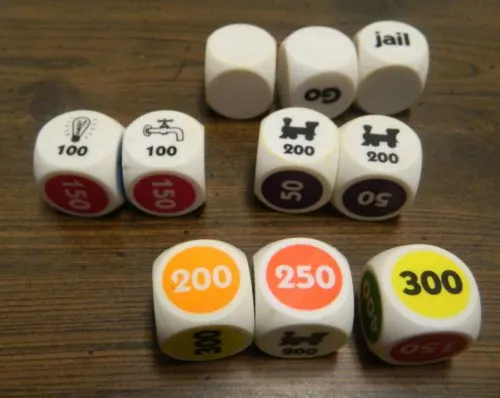
For this player’s first roll they rolled “jail” so they must set that die aside. The player can then decide whether they to keep any of the other dice. They may want to to consider keeping the two utilities and/or the railroads.
The player can then re-roll the rest of the dice that they didn’t set aside. The player can continue to roll the dice until one of two things happen:
- The player decides to quit rolling the dice and takes the points that they have earned.
- The player rolls “Go”, “To”, and “Jail”. The player’s turn ends without the player scoring any points.
If the player quits rolling the dice before rolling “Go To Jail”, the player will score points depending on what they rolled. If a player has created at least one set, the player will score points equal to all of the sets they were able to collect. If the player quits before they were able to complete a set, the player will score points equal to the sum of the dice from one incomplete set.
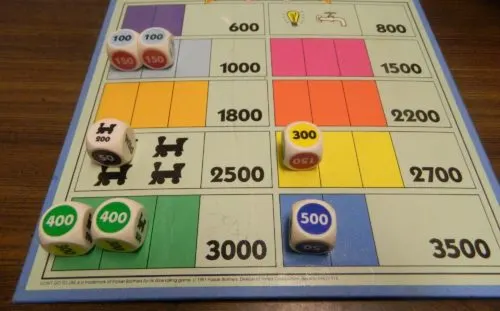
This player decided to quit but didn’t complete any sets. For their score they should take the two green dice to score 800 points for the round.
Otherwise the complete sets are worth the following amount of points:
- Purple (2 dice): 600 points
- Utilities (2 dice): 800 points
- Light Blue (3 dice): 1,000 points
- Pink (3 dice): 1,500 points
- Orange (3 dice): 1,800 points
- Red (3 dice): 2,200 points
- Railroads (4 dice): 2,500 points
- Yellow (3 dice): 2,700 points
- Green (3 dice): 3,000 points
- Dark Blue (2 dice): 3,500 points
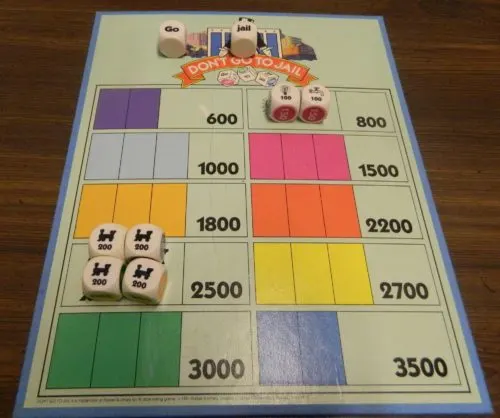
This player has completed both the railroad and utility sets. The player will score 800 points for the utilities and 2,500 for the railroads for a total of 3,300 points.
End of Game
The game ends when one of the players reach the agreed upon number of points. If all of the players haven’t had the same number of turns, the rest of the players get to take their turns. Whichever player ends up with the most points wins the game.
Additions in Monopoly Express
In addition to the rules in Don’t Go to Jail, these additional rules were added to Monopoly Express:
- Monopoly Express includes a “Pass Go” symbol on some of the sides. If the “Pass Go” side is rolled the player automatically earns 200 points.
- Once a player has completed a set they have the opportunity to role the house/hotel die for the rest of their turn. The house/hotel die has four different sides:
- House: Take one of the houses which will give you more points at the end of the round.
- Broken House: Lose one of the houses that you have already taken.
- Hotel: You can score an additional $5,000 if you already have all four houses.
- Get Out of Jail Free: You can re-roll one of the policeman (like rolling a “Go”, “To” or “Jail” in Don’t Go to Jail) that you rolled on a previous turn.
- When a player collects one or more sets they are also able to score points for one of their incomplete sets.
- Scoring is conducted in the same way but players will score an additional $1,000 for each house and $5,000 for a hotel.
My Thoughts on Don’t Go to Jail and Monopoly Express
Before beginning the review I would like to bring up that for this review I played Don’t Go to Jail which was the predecessor to Monopoly Express. While Monopoly Express slightly tweaked some of the rules, the two games basically share the same gameplay so I think this review can also apply to Monopoly Express.
So as I have already mentioned Don’t Go to Jail was one of Parker Brothers attempts to speed up the game of Monopoly. Instead of having to waste time buying properties and paying rent, Don’t Go to Jail focuses on rolling dice. Don’t Go to Jail takes the properties from the gameboard and places them on the dice. You then have to roll the dice trying to collect sets of properties like in a normal game of Monopoly. While Don’t Go to Jail does a solid job replicating the theme from Monopoly, it has nothing else in common with the game. If you took away the theme, Don’t Go to Jail would have nothing in common with Monopoly.
Basically the whole game comes down to rolling your dice to score the most points while also avoiding rolling the symbols that will send you to the aforementioned jail. A player’s turn basically boils down to roll the dice, check to make sure you have avoided jail, choose which dice to keep, and then decide if you want to roll again. With the gameplay being so simple you could easily teach the game to new players in minutes. The other name that the game goes by, Monopoly Express, also seems to be quite appropriate because you can easily finish a game in 15-20 minutes.
I honestly think the only “difficulty” in the game comes from the fact that you have to look at all of the sides of the remaining dice before you decide on whether to keep a die. What I mean by this is that since certain colors only appear on certain dice you need to make sure there are still dice remaining to complete a set before you decide to keep dice for it. This leads to a somewhat tedious process of checking out all of the sides on each and every die before you can make any decisions. While this is kind of annoying there really isn’t anything the game could have done to prevent it. You don’t want to keep dice that won’t help you and I don’t see a good way to analyze your options without looking at all of the sides of the dice.
Probably the biggest problem that I had with Don’t Go to Jail is the fact that the values of the different sets seem to be totally messed up. The value of the sets range from 600 to 3,500. So I will admit that the less valuable sets are easier to roll than the higher value sets. For example you are twice as likely to roll the dark purple set than you are the dark blue set. The problem though is that the dark blue set is between five and six times more valuable than the purple set. With this disparity between difficulty to roll and reward I don’t know why you would ever keep one of the lower sets unless you are going to quit at that point anyways. The only lower value set that I actually think is a good value is the utilities since the only dice that feature the utilities also feature all of the other low value sets. Since the utilities are much easier to roll I would suggest taking the utility set whenever you are able to roll it.
I will admit that the more valuable sets are harder to roll than the less valuable sets. The game messes up here as well though since the dark blue set is either easier or just as difficult to roll as the sets that are just below it. For the most valuable sets there is only one die face for each symbol that you have to roll. With the dark blue set you only have to roll two symbols while you have to roll three or four symbols for the other high value sets. If you don’t get all of the faces you need, you have to use a wild to complete the set. As you only have to get two dice right for the dark blue set it is actually easier to complete that set then it is to complete less valuable sets. Gameplay wise this makes absolutely no sense. The only reason the game chooses to do this is to fit the Monopoly theme.
While I never confused Don’t Go to Jail for a strategic game, these problems really hurt the press your luck mechanic of the game. With the low value sets not really even being worth your time, the game takes away most of your decision making. Outside of taking a lower set because you have already decided to quit, I really don’t see any reason to keep them. You might end the round scoring no points but you aren’t going to win the game if you mostly go for the low value sets. For example it doesn’t pay to go after a set that is worth only 1,000 points when it is not that much harder to get a set worth 3,000 points. If you get this 3,000 point set every three turns you are in the same position or an even better position than if you went for the 1,000 point set every turn. So instead of having a good risk/reward decision, most of the time it is pretty obvious what dice you should keep and whether you should quit or continue rolling the dice.
Since it doesn’t really pay to pursue the lower valued sets the game basically boils down to who is better at rolling the high value sets. While basically all dice rolling games rely heavily on luck, Don’t Go to Jail seems to rely on it even more than most. Outside of deciding which sets to pursue and when to quit you can’t make any decisions that actually impact the game. Since you pretty much should only go after the high value sets, this means the game relies almost entirely on luck. The players that roll the high value sets and avoid the jail dice are going to win the game. While I don’t mind a decent amount of luck in a game, I prefer that there be some actual meaningful decision making as well.
As I already mentioned so far I have been only able to take a look at Don’t Go to Jail so all of the comments in this review are based on Don’t Go to Jail. That being said I think most of the comments should also apply to Monopoly Express. Outside a couple slight differences, that were mentioned above, the two games play exactly the same. Despite not playing Monopoly Express I can say that I think it is better than Don’t Go to Jail for several reasons:
- The base games are played exactly the same so if you want to play Don’t Go to Jail you can easily play it with Monopoly Express.
- While I don’t think the house/hotel mechanic is going to drastically change the game I am curious about how it will change the game. It seems to add a little more decision making to the game which I would like to see. If you don’t like these rules you can just ditch them.
- The component quality for Monopoly Express seems to be better than Don’t Go to Jail. This is probably partially due to Don’t Go to Jail being being quite a bit older. I like that Monopoly Express includes engraved dice instead of just painted on symbols like in Don’t Go to Jail. It also has to be mentioned that the case for Monopoly Express is significantly smaller than the box for Don’t Go to Jail which is way too large. Otherwise the components of Don’t Go to Jail are what you would expect out of a typical Parker Brothers game.
Since Don’t Go to Jail/Monopoly Express are spinoffs of the original Monopoly it is probably appropriate to compare the two games. I honestly can’t say that either game is significantly better than the other since both have their positives and negatives. The benefits of Don’t Go to Jail come from the fact that is was designed as a quick travel game. The games take considerably less time than normal Monopoly and I would really like to see someone try to play a game of the original Monopoly while traveling. The main problem with Don’t Go to Jail is the fact that the game basically has no strategy. While you can debate how much strategy the original Monopoly has, it is still more than you can find in Don’t Go to Jail. Honestly I would probably recommend the Monopoly Card Game over both the original Monopoly and Don’t Go to Jail.
So I will admit that I really haven’t had a lot of compliments for Don’t Go to Jail. The problem with the game is the fact that it is one of the most generic dice rolling games that you will ever find. You roll the dice, decide whether you are going to press your luck and then see what happens. There is nothing terribly wrong with this type of gameplay but it also is not really any different than hundreds of other dice rolling games. Don’t Go to Jail is not a terrible game as you can have fun with it but it is the very definition of a board game focused on mindless fun.
Should You Buy Don’t Go to Jail or Monopoly Express?
Don’t Go to Jail/Monopoly Express were designed as a faster travel version of the original Monopoly. Instead of buying properties and charging rents you just roll the dice hoping to score points. Outside of the theme Don’t Go to Jail shares nothing in common with the original Monopoly. So I will say that I appreciate the simplicity and length of Don’t Go to Jail. It is a game that you can finish in 15-20 minutes that you don’t have to put too much thought into. This is the biggest problem with the game as well though. There really is very little decision making in the game. Most of these problems come from the values of the sets being way off the mark. I really don’t see many reasons why you would ever pursue the lower valued sets. This lessens the risk/reward decision since you aren’t risking much if you don’t have a valuable set. Basically Don’t Go to Jail/Monopoly Express is a decent dice rolling game that can provide some mindless fun. Don’t expect much else though.
If you don’t care for dice rolling games that rely on a lot of luck, I don’t think either game will appeal to you. Even if you don’t mind dice rolling games I think there are better games out there that do basically the same thing while also adding other interesting mechanics. Of the two games I would definitely recommend picking up Monopoly Express before I would consider Don’t Go to Jail. I see two situations where it might pay to pick up Monopoly Express. If you really like Monopoly and dice rolling games, I think you will like the combination presented in Monopoly Express. Otherwise if you find the game for really cheap and like dice rolling games it might be worth picking up.
If you would like to purchase Don’t Go to Jail or Monopoly Express you can find them online: Don’t Go to Jail on Amazon, Monopoly Express on Amazon
, Don’t Go to Jail on eBay
, Monopoly Express on eBay

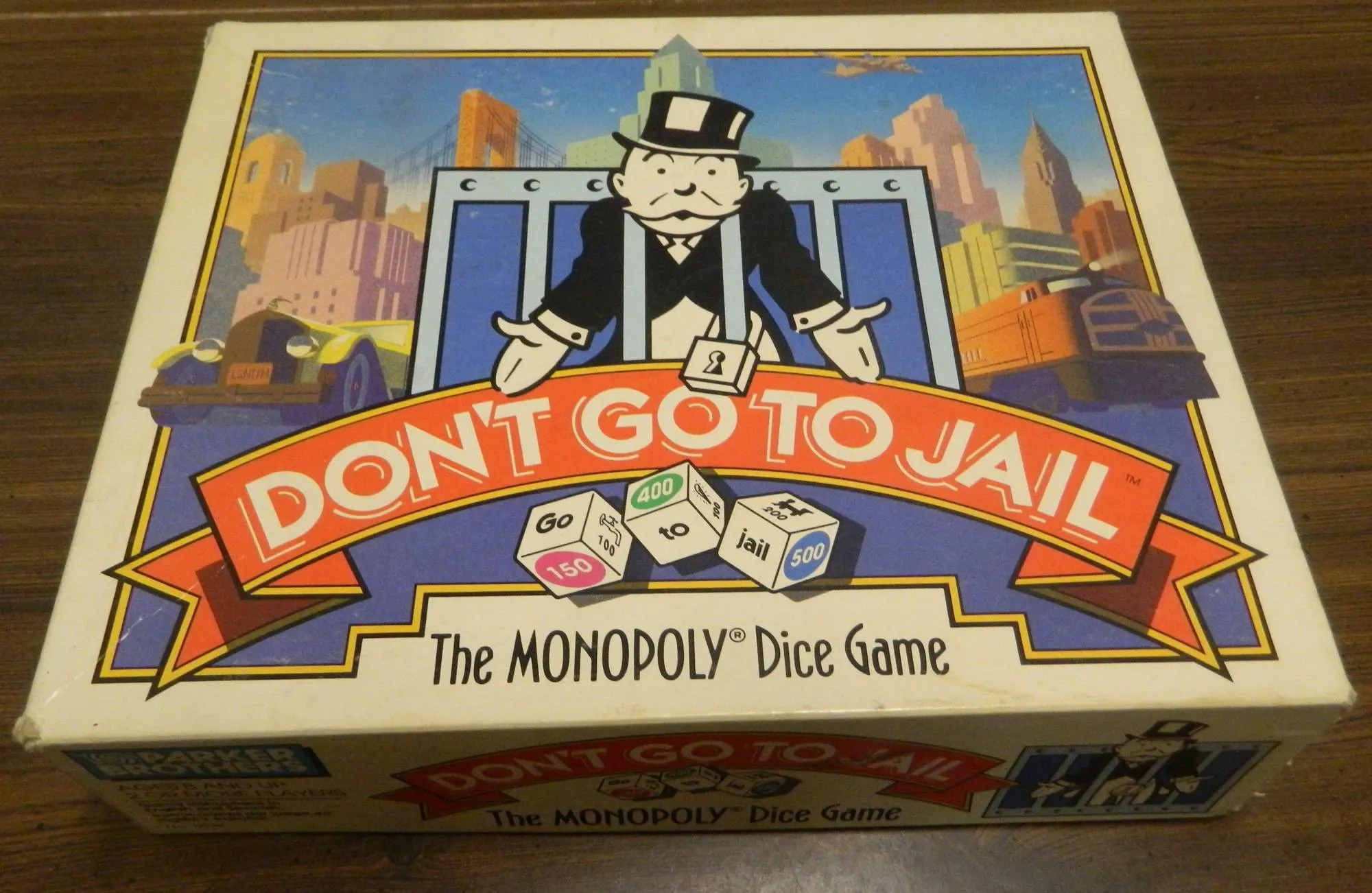
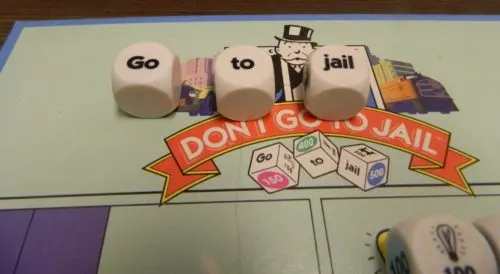
Pam
Wednesday 15th of May 2019
Don’t go to jail is a brilliant game to play with young kids where monopoly is too long for them to play. Don’t go to jail is quick and they can practice addition. They also are encouraged to understand risk taking and the concept of which dice to keep to enable them to get score the whole set. My children are now in their thirties and we played this and similar games when they were young. I am now introducing my grandchildren who are 5, 7,8 and 12 to this game.